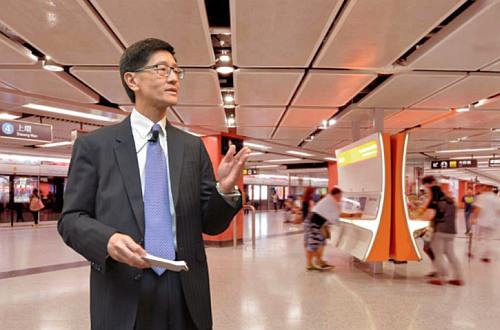According to MTR’s annual results published on March 7, the company reported revenues of $HK 45.189bn ($US 5.82bn), with increases in all business segments. This includes $HK 17.655bn from domestic operations, up from $HK 16.916bn in 2015, and $HK 13.478bn from its international businesses, up from $12.572bn the previous year.
As a result, MTR reported a recurrent business profit of $HK 8.916bn, an increase of 4.1% over 2015. Profit after investment property revaluation was $HK 10.254bn, which was down 21% year-on-year following declines in profit from property development and property revaluation.
In Hong Kong, MTR carried 1.945 billion passengers across its services during the year, an increase of 0.56%, and recorded a 99.9% on-time performance level, which is its best result since the KCRC merger in 2007.
The major operational highlights were the opening of the Kwun Tong Line extension on October 23 and South Island East on December 28, which means that all 18 districts in Hong Kong are now connected by rail. In addition, the company opened what it hopes will become a global training hub for rail professionals, the MTR Academy, in November 2016, and submitted its first proposal from the Railway Development Strategy 2014, the Tuen Mun South Extension, in December. Funding was also secured for the Hong Kong section of the Guangzhou - Shenzhen - Hong Kong Express Rail Link.
In mainland China, MTR celebrated the opening of Beijing Metro Line 16 phase 1, and in Sweden the start of Stockholm Pendeltåg commuter rail service in December.
Looking ahead, MTR has submitted two proposals for new franchises in Britain, after it ceded operation of the London Overground, where it held a 50% stake, in December. It has submitted a similar bid for a further regional concession in Sweden, the result of which will be announced in mid-2017. It is also hoping to secure a seven-year extension to the existing Metro Trains Melbourne concession, where it holds a 60% stake, having submitted a bid directly to the Victorian government in December.
In Hong Kong, the company is also expecting to report increasing patronage following the opening of the Kwun Tong Line extension and South Island Line albeit with increases to depreciation and interest expenses, which are expected to impact profits. In addition, with no developments scheduled for completion during the year, profits from property development are expected to remain muted.
MTR CEO Mr Lincoln Leong also expressed caution about the current uncertain global economic and political situation. He says that changes could potential impact the company’s performance in Hong Kong and abroad in 2017.
“The global economy faces uncertainties in 2017, with rising US interest rates and geopolitical challenges offsetting potential reflationary fiscal policies in some countries,” Leong says. “As an open trading economy, Hong Kong will feel the effects of these trends and changes, having already witnessed a slowdown in GDP growth as well as continued declines in retail sales.”

